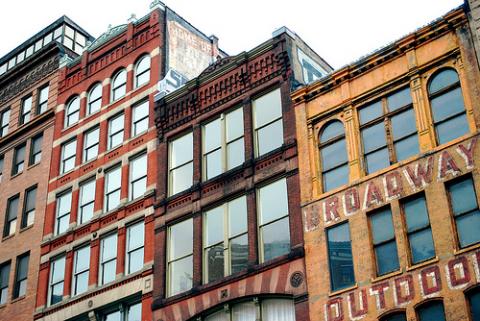Updated April 2016
Many people, when they think of Pittsburgh, tend to think of its past as the historic center of the U.S. steel industry. Not surprisingly, the demise of that industry has taken its toll on the city. At its peak in 1943, U.S. Steel alone employed 50,000 workers in the metro Pittsburgh area. Today, it employs less than 5,000. As a result, the "Steel City" has seen a steady population decline. In 1950, the population of Pittsburgh was 677,000. By 2000, it had fallen to less than half that level, or 335,000, similar to the city's population level of a century before. The Census Bureau’s estimate for 2014 is even lower— 305,412. Of the current population, about two-thirds are white, 26 percent African American, with the remainder Asian, Latino, or other.
The dramatic and sustained population decline would suggest a city in freefall. Yet that impression would not be accurate either. Though not without its problems, Pittsburgh has seen a significant degree of community revitalization and the building up of new industries, including education, health care, and technology. In 2004, former Pittsburgh Mayor Tom Murphy, who at the time was facing an $80 million city government deficit, said to the New York Times, "We're a tale of two cities. We've had … an unprecedented level of development. On the other hand, the underlying financial structure reflects a city that doesn't exist anymore.''
Key to the city’s community wealth building efforts has been the strong support and involvement from a range of anchor institutions. For example, the Pittsburgh Foundation has a grantmaking program which focuses on developing sustainable communities and in 2013 distributed nearly $29 million in grants to nonprofits in the Pittsburgh region. Similarly, the Pittsburgh Promise, established in 2007 through a 10-year, $100 million commitment from the University of Pittsburgh Medical Center, helps Pittsburgh Public Schools System students pay for higher education with scholarships of up to $40,000. As of February 2015, the effort had awarded $57.1 million to 5,584 students.
The city also boasts several strong partnerships, such as the Pittsburgh Community Reinvestment Group (PCRG), a coalition of community leaders working for economic justice, equitable investment practices, and the deployment of sufficient financial resources to revitalize communities throughout Pennsylvania’s Allegheny County. In 2011, PCRG launched its Reimagining Communities Initiative (RCI) to build capacity within distressed neighborhoods, an effort credited with raising over $1 million, leveraging an additional $6 million, inventorying the condition of 5,500 parcels, rehabbing over 100 properties, and providing more than 400 individuals with financial, foreclosure, or homebuyer counseling as of 2015. Similarly, Pittsburgh Central Keystone Innovation Zone (PCKIZ) is a consortium of higher education institutions, businesses, government agencies, and community organizations aiming to ensure the neighborhoods in central Pittsburgh can participate within the region’s knowledge-based economy. As of 2015, 41 startups in the zone were benefiting from access to tax credits, business capital, paid interns, and networking opportunities. PCKIZ is also managing and overseeing the city’s nascent Pittsburgh Wealth Building Initiative (PWBI), which aims to catalyze the creation of employee-owned/community-based businesses in low-income neighborhoods that meet the procurement and employment needs of area anchor institutions.
An overview of these and other exemplary community wealth building efforts follows:

